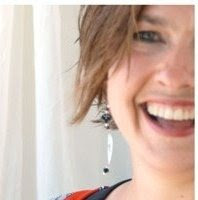We are family?
And this one, though, sticks in me -- sticks in my troubles -- the way performers talk about family sometimes, how we should treat each other more like family, meaning we should treat each other better, more kindly, with more open hearts, right? I guess that's how my inside hopeful heartsick places interpret that phrase.
But I think we do treat each other like family, already, unfortunately. 'Cause what are our experiences of family? We drop one another when it's expedient, we shut each other out and off. We take sexual advantage and then turn our backs. Isn't that family?
I get tired (and by tired I mean heartbroken-sad) of hearing about family like it should be understandable, like by referencing family as a metaphor for unconditional-yet-complicated love and acceptance, I will understand what that means. But I don't. My history of family is retracted love, pure and unabashed abandonment, extremely painful attempts at reconnection across severed ties -- and now we're supposed to make family together, you and me, we in these queer communities, and family, to me, looks like the horrifying inbred, yes, incestuous (and I use that metaphor deliberately) difficult raw puritanical stuff we have created and find ourselves struggling against.
'Cause I understand what she's talking about (how we don't outreach to family -- so how are you going to talk about 'outreaching' to queer folks of color, for example, to transwomen, to the others who are 'underrepresented' at the mainstream white queer gatherings that many of us find ourselves participating in), and I love it with all the inside webs of my heart.
But/And, also -- we need a different word.
I understand about needing replacements, about using and reclaiming 'family' to mean queer sisterbrothers and brothersisters, but we bring with that word all the baggage that shaped us crooked and raw and bent and ashamed and scarred. We carry into that word, and this new collection of people we're trying to connect with, all the pain that that word learned to bear, all the while we were learning to keep ourselves alive within its bounds, until it was gone.
How do we make 'family' good? How can we engender that word into something worthwhile, settle into it with a sense of hope instead of trepidation? You say we are family -- to me that means there is no hope between us, no common language, a warped tongue, an indelible severing. That's where I grow out of.
Not outreach but reunion. Maybe this truth of family is the way of all of us, and reunion will be painful alongside possible, as much as when I return to my blood family and see the shapes that crafted me and feel cup around my face each pair of arms and every set of hands that released me into the grip of a monster. Is that how we feel each other -- that we sisters and brothers and others haven't stood up for each other enough, haven't protected each other enough, haven't sent enough letters or enough I Miss You cards, or called enough to hear how your life is, to hear how he blessedness flows and hear how the hurts hit you and how can I share in both?
I don't do those parts very well, I'll admit it, the reaching out. She says we don't outreach to family, and I get her meaning, and and and -- I always feel like it's an outreach when I try to touch anyone with a tie to my insides: old friends, blood family -- a tentative feeling those lines: Are we still connected? Have you dropped me yet?
More and more thinking on this to come ... so many thanks to you, Ryka, for these considerations, this possibility, your words!
Labels: community, family, morning write, queer folk


